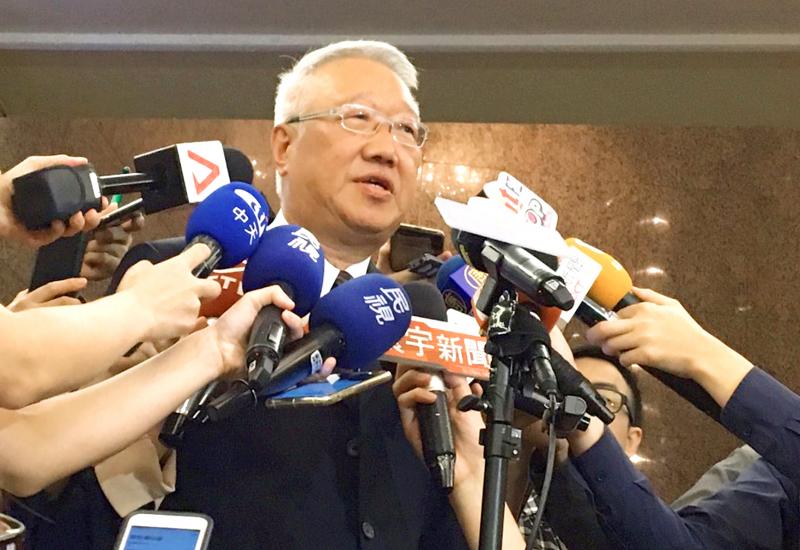Cheng Uei Precision Industry Co (正崴精密), a Taiwan-based cable and connector maker, plans to start mass production for Apple Inc later this year from its new plant in India, a person familiar with the matter said, the latest sign of the US company’s increasing presence in the South Asian country.
Apple’s major assembly partners, Taiwan’s Hon Hai Precision Industry Co (鴻海精密) — known internationally as Foxconn Technology Group (富士康科技集團) — Pegatron Corp (和碩) and Wistron Corp (緯創), have all set up either a subsidiary or an iPhone assembly plant in India.
The chairman of Cheng Uei, also known as Foxlink, is Gou Tai-chiang (郭台強), the brother of Hon Hai founder Terry Gou (郭台銘).

Photo: CNA
India is trying to attract manufacturing for Apple, Samsung Electronics Co and other major smartphone brands with an incentive program, as political tensions between the US and China escalate.
The global COVID-19 pandemic has increased also pressure on companies to review their supply chains.
Cheng Uei said in a statement on Friday that a company engineer was caught on internal video surveillance this month damaging automation equipment at the new plant near Chennai, India.
The suspect is a Chinese national, and the incident was reported to local police and the Chinese authorities, it said.
Separately, companies from Taiwan and India on Thursday signed four memorandums of understanding (MOUs) for further industrial cooperation in areas ranging from green technology to electronics.
During the Taiwan-India Industrial Collaboration Summit, which was held online this year due to COVID-19, representatives from both nations vowed to work more closely amid the pandemic and the US-China trade dispute, which have accelerated restructuring of the global supply chain.
It is an opportune moment for the two nations to cooperate, as India is eager to replace China as the next “world’s factory” after seeing many businesses relocate from China to India, Southeast Asian countries and US-Mexico border areas, officials said.
The two nations could cooperate in the electronics sector, one of Taiwan’s strongest areas, Deputy Minister of Economic Affairs Chen Chern-chyi (陳正祺) said, adding that he hopes India will be able to offer incentives such as bureaucratic reduction.
The two nations have made good progress in bilateral relations under Taiwan’s New Southbound Policy, and Taiwanese businesses have instigated 108 investment projects in India since 2016, worth more than US$800 million in total, Chen said.
Companies involved in the MOUs include Solid State System Co (鑫創) and Dyfenco International Co (岱暉) from Taiwan, as well as Smile Electronics and SB Packagings from India.
Cohosted by the Chinese National Federation of Industries and Federation of Indian Chambers of Commerce & Industry, the summit has been held annually since 2017.

The US dollar was trading at NT$29.7 at 10am today on the Taipei Foreign Exchange, as the New Taiwan dollar gained NT$1.364 from the previous close last week. The NT dollar continued to rise today, after surging 3.07 percent on Friday. After opening at NT$30.91, the NT dollar gained more than NT$1 in just 15 minutes, briefly passing the NT$30 mark. Before the US Department of the Treasury's semi-annual currency report came out, expectations that the NT dollar would keep rising were already building. The NT dollar on Friday closed at NT$31.064, up by NT$0.953 — a 3.07 percent single-day gain. Today,

‘SHORT TERM’: The local currency would likely remain strong in the near term, driven by anticipated US trade pressure, capital inflows and expectations of a US Fed rate cut The US dollar is expected to fall below NT$30 in the near term, as traders anticipate increased pressure from Washington for Taiwan to allow the New Taiwan dollar to appreciate, Cathay United Bank (國泰世華銀行) chief economist Lin Chi-chao (林啟超) said. Following a sharp drop in the greenback against the NT dollar on Friday, Lin told the Central News Agency that the local currency is likely to remain strong in the short term, driven in part by market psychology surrounding anticipated US policy pressure. On Friday, the US dollar fell NT$0.953, or 3.07 percent, closing at NT$31.064 — its lowest level since Jan.

The New Taiwan dollar and Taiwanese stocks surged on signs that trade tensions between the world’s top two economies might start easing and as US tech earnings boosted the outlook of the nation’s semiconductor exports. The NT dollar strengthened as much as 3.8 percent versus the US dollar to 30.815, the biggest intraday gain since January 2011, closing at NT$31.064. The benchmark TAIEX jumped 2.73 percent to outperform the region’s equity gauges. Outlook for global trade improved after China said it is assessing possible trade talks with the US, providing a boost for the nation’s currency and shares. As the NT dollar

PRESSURE EXPECTED: The appreciation of the NT dollar reflected expectations that Washington would press Taiwan to boost its currency against the US dollar, dealers said Taiwan’s export-oriented semiconductor and auto part manufacturers are expecting their margins to be affected by large foreign exchange losses as the New Taiwan dollar continued to appreciate sharply against the US dollar yesterday. Among major semiconductor manufacturers, ASE Technology Holding Co (日月光), the world’s largest integrated circuit (IC) packaging and testing services provider, said that whenever the NT dollar rises NT$1 against the greenback, its gross margin is cut by about 1.5 percent. The NT dollar traded as strong as NT$29.59 per US dollar before trimming gains to close NT$0.919, or 2.96 percent, higher at NT$30.145 yesterday in Taipei trading